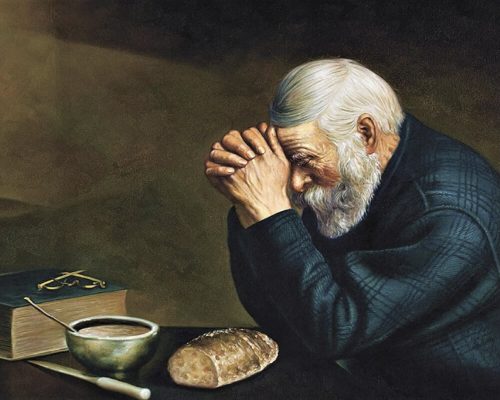
In the spiritual evening of the month of May, we tried to discern some ideas from the Lord’s prayer starting from the Gospel and the interpretations of the Holy Fathers.
The text of the prayer is found in the Gospel according to St. Luke and St. Matthew: “In this manner, therefore, pray: Our Father in heaven, hallowed be Your name. Your Kingdom come. Your will be done on earth as it is in heaven. Give us this day our daily bread. And forgive us our debts, as we forgive our debtors. And do not lead us into temptation, but deliver us from the evil one. For Yours is the Kingdom, and the power and the glory forever. Amen!” (Matthew 6, 9-13). That “therefore” (gr. οὕτως) does not only mean with this prayer, but it is an example of what the form and content of an authentic prayer should be. Our tendency when we pray is, perhaps, to have before God an individualistic or selfish addressing. But the Savior obliges us to place ourselves in a community position, “Our Father…”. The entire prayer “Our Father” is in the plural; it is a prayer of a person that represents other people. The Savior gave it to us as an example of prayer. And we can observe that this is how true spiritual people, saints, pray. We also have a couple of examples:
Archimandrite Zacharias Zacharou: “Lord, I come before You with all my brothers. Bless our appearance before You. I thank You, Lord, for all the gifts that You have placed in my brothers. Let us relish in mind, heart, and spirit in the remembrance of Your honorable name. Pour out Your grace over us all. Fill us with the great consolation of Your goodness. And grant that none of us depart from Your holy church without being comforted with the incorruptible comfort of Your Most Holy Spirit.”
Saint Nicholas Velimirovich: “Our Father! You are our Father, of everyone: I would shrink You and shrink myself if I would call you: My Father. Our Father! You take care of me, who am one, but even more of the entire world. Your goal is Your Kingdom, not one person. Self-love yells: My Father!, while love yells: Our Father! On behalf of all people, who are my brothers, I pray to You, Our Father! On behalf of all beings that surround me and with which you have interwoven me, I pray to You, Our Father! I pray to You, Father of the Universe, for a single thing I pray to You: may the great day dawn as soon as possible when all people, living and dead, together with the angels and stars, with those animate and inanimate, will call You with your true name: Our Father!”
Also, when we ask for “our daily bread,” we ask to be in communion with all people. Saint Nicholas Velimirovich comments, “I do not pray to You for my bread, but for our bread. What’s the use if only I have my bread, when my brothers around me hunger? It would be better and fairer if it were taken from me a bitter bread of self-love; better to endure hunger together with my brothers. It can’t be Your will for only a single person to thank you, while a hundred curse you. Our Father, give us our bread, so that we may glorify You in one voice and joyfully remember our Heavenly Father.” At the words, “deliver us from the evil one,” we are reminded that the single author of evil is the enemy. St. John Chrysostom teaches us: “The evil one is named here the devil. The Lord commands us to wage unreconciled war with him… Therefore, the Lord did not say: deliver us from the evil ones, but the evil one, teaching us to not hate our brothers for the evils we suffer from them, but to direct our hate from them to the devil, because he is the cause of all evil.”
The prayer, “Our Father” is a hypostatic prayer, it brings a person into a state in which he encompasses everything. We have an example from Father Zacharias’ mother. One morning, when Father was preparing for Liturgy, but could not pray due to fatigue and exhaustion, he heard his mother, at five in the morning, whispering in her room. He went and opened her door and saw his mother, who was semiparalysed in bed, doing prostrations however she could, saying: “Lord, have mercy on my kids and on the world.” Or the mother of our abbot from Putna, who commemorated so many saints saying: “Holy so-and-so, so-and-so has I don’t know what problem.” These are holy souls, and they naturally prayed like this. This is the person who brings everyone before God. To this we are exhorted in the Lord’s prayer, to expand our hearts and to be like Him, praying like Saint Silouan so that “all men to be saved and to come to the knowledge of the truth” (1 Timothy 2, 4). The tragedy is that we, being Christians, do not pray like this.
